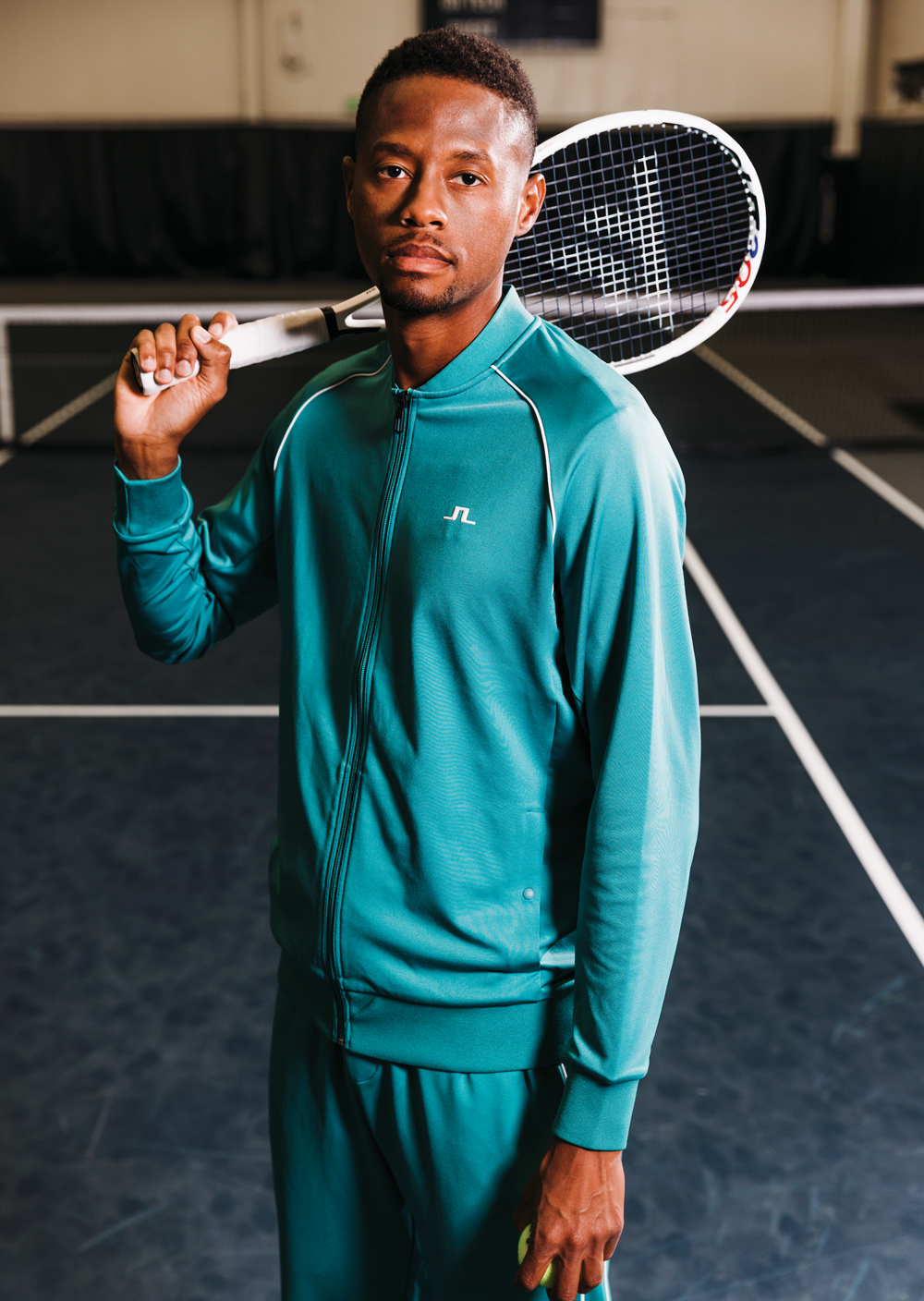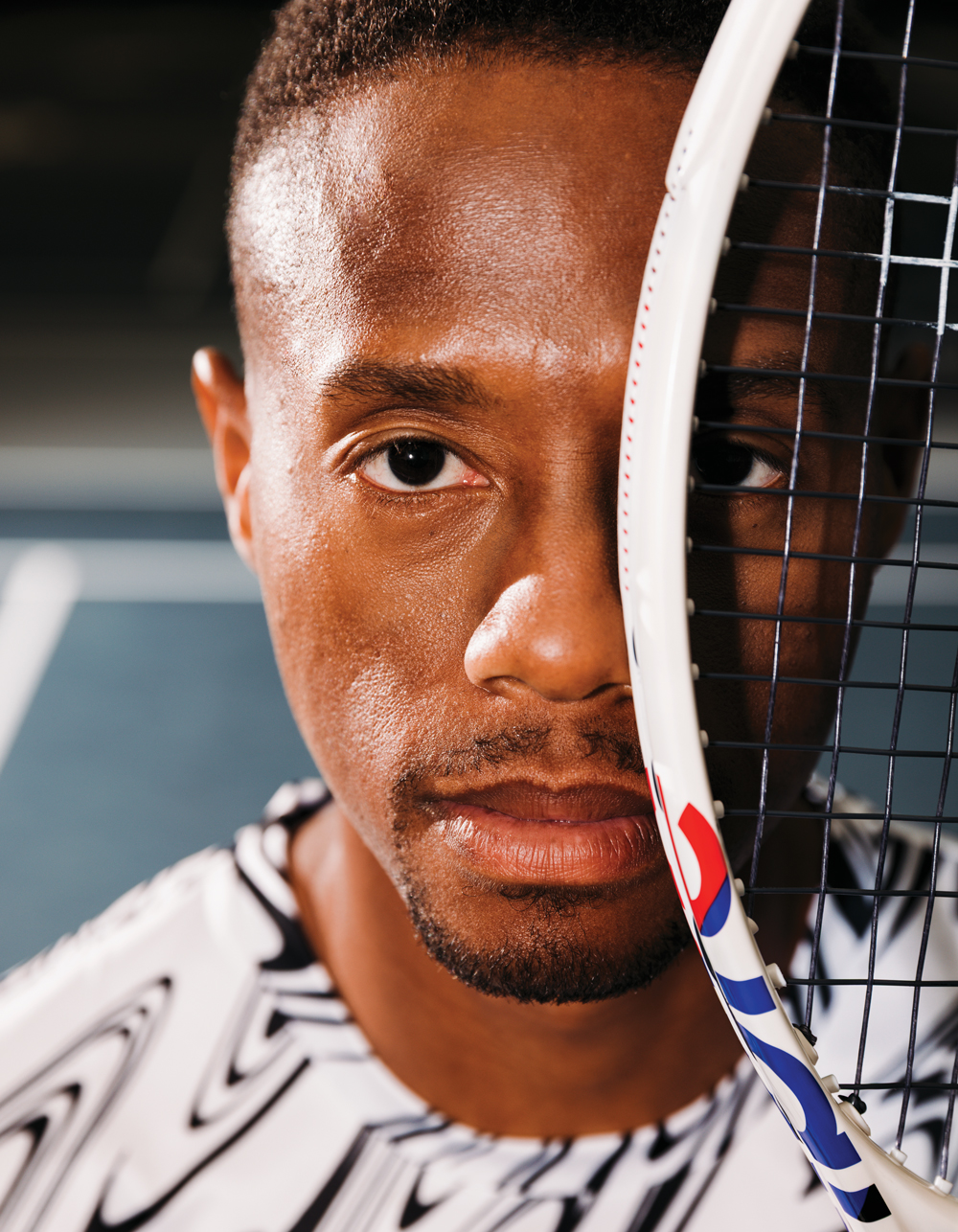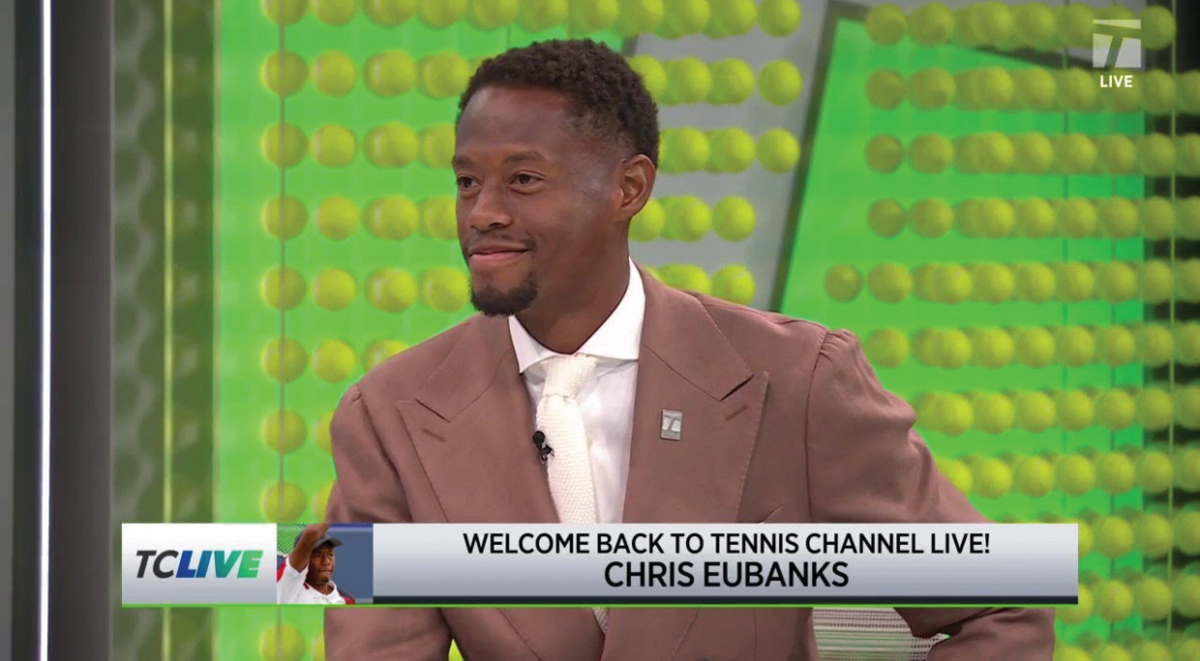
Photograph by Growl Bros. Grooming by Jenny Lova/Ursula Wiedmann Models
Sometimes, when his game feels off, Christopher Eubanks watches his own highlights on YouTube. Some of the videos he searches for are from the summer of 2023, when his tennis game peaked at the perfect time and place. He usually chooses his match against Stefanos Tsitsipas, the fifth best player in the world.
On his screen, playing on Wimbledon’s Centre Court, Eubanks is on fire. His serve clocks in at a blistering 129 mph, and he rushes the net constantly, pouncing on his opponent’s off-balanced returns. Four hours into the match, in the fifth set, instead of hitting a conservative second serve in play, he hits a 121 mph ace on the center line that freezes Tsitsipas still. Eubanks looks at his coaches in the stands, raises his eyebrows, and laughs.
In the clip, Eubanks is 47th in the world, but his play at Wimbledon is beating the best. After another long rally, he stretches his six-foot-seven frame to place a backhand drop shot just out of Tsitsipas’s reach. Eubanks now turns to the onlookers, already on their feet, and waves his arms up and down, sending them into a frenzy.
To finally win the match, he smashes a forehand past Tsitsipas. Eubanks’s hands are on his head and his mouth wide open as he takes in another drowning standing ovation from the crowd. “Wimbledon was such a blur,” Eubanks says, watching the highlights. “I was hardly thinking about anything, just my opponent. I was so focused that I can’t remember a lot of it.”
Eubanks, who grew up playing on the courts of the South Fulton Tennis Center, announced himself at Wimbledon in 2023. His string of upset wins was impressive, but the reckless abandonment he played with, plus the shock on his face after every win, made him a crowd favorite. His run ended in the quarterfinals, the furthest an American man had gone at the tournament since 2017, and his ranking jumped to number 29 in the world, a career high.
But since that summer on grass, Eubanks hasn’t been back on tennis’s biggest stages. The old adage “You’re only as good as your last game” rings particularly true for professional tennis: One bad day in the office punishes players’ ranking, which determines everything from the tournaments they play to the sponsorships they get. A bad year can sink their career. In 2024, Eubanks lost in the first or second round of all four Grand Slams, including a first-round exit at Wimbledon. A year and a half later, his ranking sits at 104th in the world, forcing him to play grueling qualifying tournaments at major events to make the main draw.
At 28, Eubanks’s window to rediscover his Wimbledon form is narrowing. His story begins and continues in Atlanta, where he trains in search of the confidence that has made him a world-class tennis player, if only for a moment.
● ● ●
When Georgia Tech head coach Kenny Thorne showed up to a practice at the South Fulton Tennis Center, he saw a unicorn.
Already at a lanky six feet, seven inches, a 17-year-old Eubanks hit with Donald Young Jr., a fellow Atlantan and, at the time, an established pro on the tennis circuit. Eubanks stumbled over himself at times trying to reach Young’s returns, but he would find his feet to hit a smooth one-handed backhand. His whip of a forehand sprayed across the court, with only so-so accuracy. Thorne knew that if Eubanks could develop a reliable winning forehand and a powerful serve, he could be one of the best players in the country.
For Thorne and most college coaches, Eubanks came out of nowhere. He was a late bloomer, who only popped up on Georgia Tech’s radar when he nearly beat a program commit at the 2013 USTA Southern Championships a few weeks before Thorne’s visit to South Fulton. Thorne offered Eubanks a spot on Georgia Tech’s team days after he saw him hit with Young.

Photograph by Getty Images
Unlike many of his college and pro peers, Eubanks is a product of the tennis centers in Atlanta’s public parks rather than those at country clubs or private tennis academies. His dad, Mark, and his older brother, Mark Jr., picked up tennis as a hobby because southwest Atlanta has so many accessible spots to play.
Eubanks’s first memories of tennis, and life, are at Burdett Tennis Center in College Park. When he was four years old, his dad gave him a racket and a tennis ball and told him to go beat the wall. He played in his first tennis tournament at the South Fulton Tennis Center when he was eight. Eubanks lost in a close match in the final, which was enough for his dad to see his potential. “My parents were super busy, with my dad working at Delta and my mom at a bank, but our lives became tennis,” Eubanks says. “So I went to school and then played tennis for hours after.”
Around this time, a golden age of junior tennis was happening in south Atlanta. Young (formerly the number one junior tennis player in the world), Taylor Townsend (currently the third best female doubles player in the world), and Zack Kennedy (who later rivaled Eubanks in college) all grew up in the area. (Several years later, a certain Coco Gauff also developed her game in south Atlanta.)
“When they were eight years old, Zack and Eubanks would be the only Black players at some tournaments, so our families connected,” says Sam Kennedy, Zack’s dad and coach. “We all started to hit together, and we just latched onto one another, because that’s what it took.”
“He can articulate tennis better than almost anyone, and you know, it’s important he does it as a Black man.”
— Sam Kennedy
Mark Eubanks and Kennedy were self-taught in tennis, and the dads worked together to impart good form and a strong mental game to their sons. “Chris’s dad is very disciplined, and his son was the same,” Kennedy says. “Chris was a calm kid, which made him a great learner for tennis, soaking up everything like a sponge.”
Even with a childhood dedicated to tennis, Eubanks still experienced growing pains. He was a good junior player but felt he was behind the other juniors who had better training. He played closely with Zack and other strong players but lost matches when doubt crept in. By the time Eubanks got to Westlake High School, Zack played ahead of him on the varsity tennis team. Another hurdle was his height. “He got so tall and skinny at 13, 14, that his head couldn’t tell his arms what to do fast enough,” Kennedy says.
In the car on the way to school in the fall of his sophomore year, Eubanks remembers his dad telling him it was time to look at tennis as all or nothing. “He decided that I would start going to South Fulton and train with Donald and the Youngs,” Eubanks says. “There was no warning but also no argument. I felt I wasn’t good enough, but the opportunity was undeniable.”
Eubanks idolized Young, whom many expected to quickly become a top pro player. His parents ran the South Fulton Tennis Center, and when Eubanks joined their tutelage in the fall of 2011, Young was preparing to play tournaments on the pro tour as a 22-year-old. Over a few months of daily lessons, Eubanks’s game improved quickly, and in May 2012, Young offered to bring Eubanks on tour with him.
They traveled all over the world that summer, with Eubanks as Young’s hitting partner. “Donald was like my big brother during that trip, and he constantly told me that I was good enough, which was something I really needed to hear,” says Eubanks. “Like, this was a guy who looked like me, from the same side of town, who was always telling me I could do it.”
While Eubanks was in Europe, he missed a crucial summer tennis season for recruiting, when college coaches scout and extend offers to talented high schoolers. But when he returned to practice at Westlake for his junior season, he beat Zack for the first time.
● ● ●
After Eubanks received his offer to Georgia Tech, the decision for his tennis future again was made for him. “My dad told me that I was going to Georgia Tech,” Eubanks says. “Tech made the most sense with it being home, plus I could still practice with Donald. I think I would have made the same decision.”
That decision, ultimately, panned out well for Eubanks. After developing a serve and refining his forehand, he became one of the best players in Georgia Tech tennis history. In three years in the program, he became a two-time All-American and earned Atlantic Coast Conference Player of the Year twice. He excelled in singles, reaching 90 career wins, which ties him fifth all-time at Georgia Tech.
In 2017, he entered the main draw at the Atlanta Open and won his first two professional matches. His performance resulted in a wild card entry to the U.S. Open, where he lost in the first round. As he approached his senior year at Georgia Tech, Eubanks had proved to himself that he was ready to turn professional. This time, he made the decision himself, without consulting his family or coaches.
Going pro is easier said than done. Although Eubanks had traveled with Young throughout high school, he was now on his own. He spent the first four years of his career fluctuating between 150th and 230th in the world, playing many small events on tour to find his footing and trying to reach Grand Slams by qualifying. By 2021, his major achievements were a tournament win at an ATP Challenger event in Knoxville and a 2020 U.S. Open doubles quarterfinal appearance. “I always thought it was a matter of time before the results came, but they didn’t,” Eubanks says. “I wasn’t thinking about quitting per se, but I began to feel like I was losing time.”

Photograph by Growl Bros
His breakthrough came in 2022, off the court. Eubanks saw his fellow Atlantan Taylor Townsend commentating for the Tennis Channel for Women’s Tennis Association (WTA) events that she didn’t play in. Eubanks loved to talk about tennis with other pros and thought commentating might be fun. His agent reached out to the Tennis Channel to see if there was an opportunity for him to play a similar role. His first match as an announcer was at the 2022 edition of the Knoxville ATP Challenger, the same tournament he had won the year before.
Announcing felt natural for Eubanks and brought an unexpected benefit. In the booth, he couldn’t surf highlights. It forced him to watch matches start to finish, and he started to pick up on the attitudes and patterns that led to success. “Everything seemed so glaringly obvious,” Eubanks says. “I could see myself in a lot of the guys who lost close matches, so if I focused on the little things, I could beat them.”
Eubanks put together the pieces of his puzzle in 2023. In March, he reached the quarterfinals of the Miami Open and lost a close match to the world number three, Daniil Medvedev. For the first time in his career, Eubanks cracked the top 100, debuting at 85. But at the start of the summer grass season, Eubanks was upset in the first round of a small tournament called the Surbiton Challenger.
He texted a friend, Grand Slam champion Kim Clijsters, that “grass is the stupidest surface to play tennis on.” Eubanks was surprised that Clijsters would admit she also struggled on grass, and she told him to move on the court more, which should help him get his feet underneath him for both his body and mind.
It was what he needed to hear. He won his first ATP Tour title on the grass courts in Mallorca, Spain, on a Saturday, and started qualifiers for Wimbledon on Monday. After the tour win, he started to trust his game. “I was like, I can’t win Mallorca and not get to the first round,” Eubanks says. “Then, once I was in the round, I really just wanted to play on grass as much as I could. After each win, I just thought, Who’s next?”
His confidence was so high that you’d forget this was his Wimbledon debut. Next was Cameron Norrie, the 12th best player in the world and number one Brit, backed by his home crowd. To open the second-round match, Eubanks hit a pair of aces, then a smashing forehand winner. He played a nerveless match that dispatched Norrie in four sets. In the third round, Eubanks took care of Australian Christopher O’Connell in straight sets. You know what happened to Tsitsipas in the fourth round.
For the quarterfinal, Eubanks matched with Medvedev again. Eubanks felt prepared after their Miami matchup and by commentating on a few of his matches earlier that spring. After losing the first set 4–6, Eubanks’s serve became unstoppable, his play at the net impeccable. Eubanks won the second and third sets in a dominating fashion: 6–1 and 6–4. Medvedev had made only six errors up to that point, but Eubanks was still playing him off the court.
With the fourth set tied at 6–6, Eubanks’s serve faltered, and Medvedev evened the match. Maybe it was the heat, or maybe it was the eight matches he had played in two weeks; Eubanks looked exhausted and lost the final set 6–1.
● ● ●
This winter, Eubanks hibernated at the Byers Tennis Complex, an indoor facility on Georgia Tech’s campus. Other than a year living in Florida, Eubanks has always stayed in Atlanta, recently moving to an apartment on the Beltline to be closer to where he trains. He’s back in the lab, running through very specific match scenarios with his coaches to mentally prepare.
After his Wimbledon run, Eubanks has struggled to replicate the same form. On the court, he earned spots on Team USA rosters for the 2024 Davis Cup and 2024 Paris Olympics, but with middling results. On the tour, Eubanks lost in the first round of many tournaments, including Wimbledon. Off the court, though, Eubanks has appeared more and more in the commentary booth. He now serves as an analyst and on-court reporter with ESPN at Grand Slams, most recently at the U.S. and Australian Opens, after he exited those tournaments.
“He can articulate tennis better than almost anyone, and you know, it’s important he does it as a Black man,” Sam Kennedy says. Many of the junior players Kennedy coaches at South Fulton look up to Eubanks and tune in to ESPN to watch the hometown hero commentate. “But the coach in me knows that you can’t replicate Wimbledon unless you’re ‘all in’ one thing.”

Photograph from YouTube/The Tennis Channel
Eubanks is careful to balance commitments while recognizing that analyzing tennis unlocked something different at Wimbledon. “I really think commentating has helped me personally,” Eubanks says. “But I’m a tennis player first, and commentating should still just be an opportunity.”
Recently, there have been signs that Eubanks is ascending again. In November 2024, he won the ATP Challenger in Knoxville, the same tournament that precipitated his success at Wimbledon. Eubanks is confident that his prior up-and-down year made him stronger, and he hopes to get back to where he was as a player, and potentially better than before.
In his Beltline apartment, he watches his Wimbledon matches more and more. “It’s cool to see how I served that day and my great shots, but it’s not necessarily to reminisce,” he says. “I want to do everything to get back to that level. I’m trying to remember how I felt.”
This article appears in our April 2025 issue.
Advertisement




